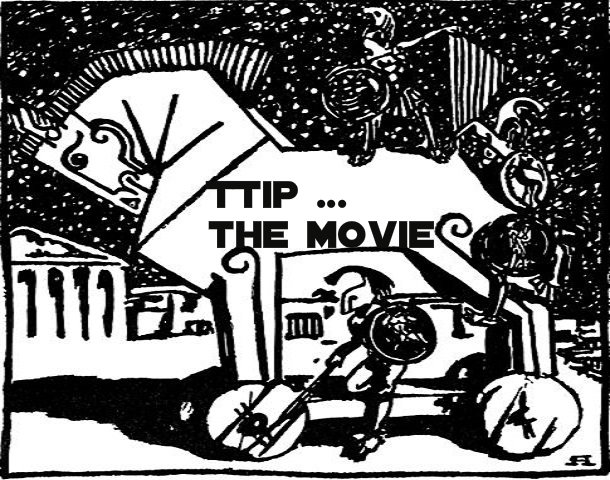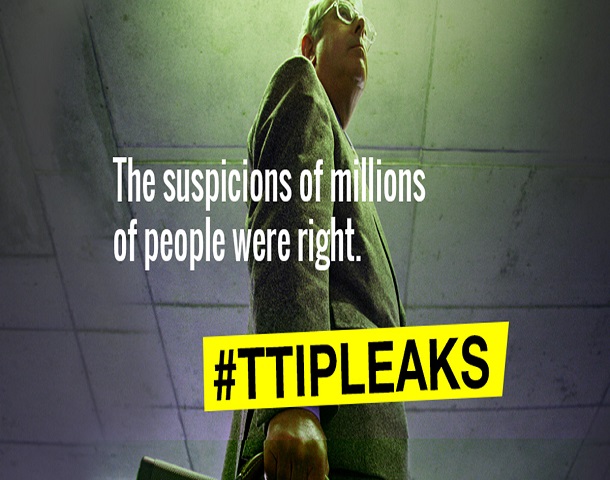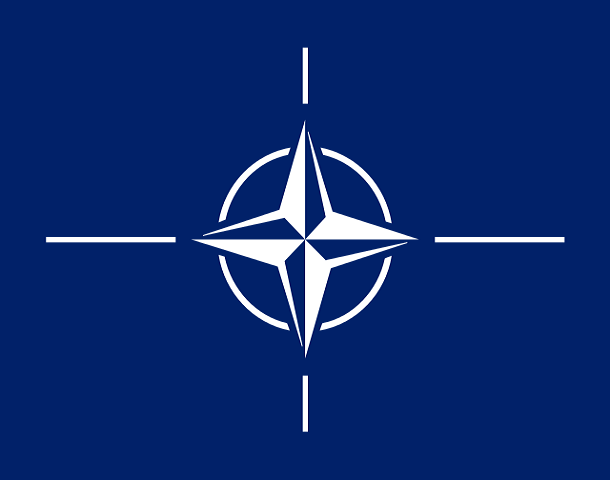
 Branko Malić
Branko Malić
21st Century Wire
TTIP leaks, already widely referred to as TTIP Papers, are still a hot topic in mainstream media. However, do they reveal anything we already haven’t known beforehand? Apparently, no.
Some two and a half years ago I caught wind of humongous “free trade” deal being negotiated in semi-secrecy between representatives of US and EU business, financial and political elites. At that time, Transatlantic Trade and Investment Partnership or TTIP was still not a hot story in my country and my article on it was one among the earliest exposes in Croatian. I wrote it at the end of November of 2013., in the wake of the third round of TTIP negotiations.
Well, the Left in my ‘hood eventually caught up with TTIP and did it’s thing, i.e. started to organize petitions signings, protests and dissemination of anti-corporate Facebook and Twitter memes, while Libertarians rose up to defend the holly name of “Free Trade”, regardless of the blatantly obvious fact that TTIP is primarily a political, and only secondarily economical, bilateral treaty.
Maybe I’m just cynical, but I considered all that blazé outrage about “democracy deficit” (accidentally, the term coined by EU word-shops to keep public narrative predictable) and “unheard of secrecy” rather childish, since you don’t have to apply a lot of discerning power to realize that consolidation of transcontinental blocs by it’s very nature cannot be democratic and that, on the other hand, free trade is free only insofar as it doesn’t stray from the preordained geopolitical playfield, carved by superior power – mainly NATO.
So, when I figured out the main point of TTIP – which was no great feat, because it was never hidden from public – namely that it is essentially aimed at removal of non-tariff barriers – since customs tariffs between EU and USA are negligible by corporate standards – meaning everything that could impede the corporate public-private partnership activity, I gave this important matter a pause and waited until something new pops up.
I never lost a minute of sleep over those Trojan horse memes, until few days ago when we got treated with “TTIP leaks”
TTIP leaks
 Suitcase totting bureaucrat … awkward gaze in his eye … ominous lighting … the millions – INCLUDING YOU!!! – were right. Kinda movie-like, isn’t it? (Image source: Greenpeace Netherlands)
Suitcase totting bureaucrat … awkward gaze in his eye … ominous lighting … the millions – INCLUDING YOU!!! – were right. Kinda movie-like, isn’t it? (Image source: Greenpeace Netherlands)
The term denotes the action of Greenpeace Netherlands which, on May, 02. published a batch of documents produced in the course of secret negotiations between US and EU representatives, leaked – forgive the crudeness of metaphor – into their hands by undisclosed source, and comprising 248 pages of text (the redacted documents are available for download at this link).
(…) The documents that Greenpeace Netherlands has released comprise about half of the draft text as of April 2016, prior to the start of the 13th round of TTIP negotiations between the EU and the US (New York, 25-29 April 2016). As far as we know the final document will consist of 25 to 30 chapters and many extensive annexes. The EU Commission published an overview stating that they have now 17 consolidated texts. This means the documents released by Greenpeace Netherlands encompass 3/4 of the existing consolidated texts.
The text is, shall we say: quite damning for negotiators and it is obviously “democratically deficient” and “outrageous”. Yet, for all that brouhaha of phrases, consternation and astonishment, something seems to be amiss here. Namely, for all intents and purposes, the leak has revealed nothing public hasn’t known already, some two years ago. In fact, as we shall see, it revealed less.
So what’s in it? Well, according to Greenpeace,
(…)None of the chapters we have seen reference the General Exceptions rule.(…) The omission of this regulation suggests both sides are creating a regime that places profit ahead of human, animal and plant life and health.
Climate protection will be harder under TTIP
The Paris Climate Agreement makes one point clear: We must keep temperature increase under 1.5 degrees to avoid a climate crisis with effects on billions of people worldwide. (NOTE: this is a crude misreading – or indeed, a non-reading – of Paris Agreement whose Article 2.1. a. states that nations should keep the temp under 2.0 C and only “pursue efforts” to keep it under 1.5 C. In the terms of climate non-deal this is extremely important difference. BM) Trade should not be excluded from climate action. (…)
The end of the precautionary principle
The precautionary principle, enshrined in the EU Treaty, is not mentioned in the chapter on Regulatory Cooperation, nor in any other of the obtained 12 chapters. (…)
Opening the door for corporate takeover
While the proposals threaten environmental and consumer protection, big business gets what it wants. Opportunities to participate in decision making are granted to corporations to intervene at the earliest stages of the decision making process.
READ MORE AT: Greenpeace International
According to these points, I’ve already figured out what the TTIP is all about more than two years ago, because this, sans global warming bullshit, was more or less what was obvious to anybody sporting some modicum of discernment even then. The summary of the whole affair would be:
“The corporations (NOTE: it’s always an abstract moniker, or some big, bad name like MONSANTO. That way you don’t get to learn the personal names) (…) are creating a regime that places profit ahead of human, animal and plant life and health“.
You don’t say …
Snowden, Panama Papers, TTIP leaks and Süddeutche Zeitung connection
Well, with all due precautions about jumping to conclusions, I do smell a rat here. Namely, the whole TTIP leaks affair bears a striking structural resemblance to at least two other “scandals” of yesteryears and yesterdays: the Snowden affair and so called Panama Papers.
Listen to British author Tom Secker point out absurdities and Hollywood-like scripting of Snowden affair (source: Mind Renewed)
The main resemblance lies in the fact that nothing new has been uncovered, but we are, supposedly, reinforced in our secret beliefs – we are proven right and made aware of existence of evidence to that effect. Differences, on the other hand, are more of a pecuniary nature: while “agent Snowden”, who informed us – through plethora of various documentary evidence which he haven’t made directly accessible to the public – that we are being watched by security agencies, was quite a hefty production (lone ranger with sexy girlfriend, trips around the world, Russians involved, etc., etc.) that warranted a Hollywood movie, “Panama Papers” ended up being a short-term “leak-as-a-spectacle” event – with a potential for evolving into “leak-as-a-soap-opera” – that virtually revealed nothing of interest. The main point was, and remains, that there’s a whole lot of terabytes of information leaked about rich people depositing their ill gotten gains in the safe place via shell companies.
Well, who would have guessed … some people abuse power …
Sarcasm aside, there’s one thing about nature of information itself that often gets overlooked in independent media. Namely, information is not knowledge. It is an essentially quantifiable input of sensory data which can be qualified, synthesized and understood only insofar it’s intake is being limited to human capacities.
Terabytes of information exceed human capabilities or we wouldn’t call them terabytes in the first place. What you get from ingestion of such quantity of information is not knowledge but infatuation.
Yet nobody is really expected to do that. You have designated “experts” from media-sphere to do it for you. Therefore if we are to keep to the movie analogy, Snowden Affair is infotainment James Bond, while Panama Papers are Turkish Rambo for plebe’s consumation. Take your pick:
.
MOVIES: it’s not about truth … it’s about the costs of production
Hence, no one is really expected to read through Panama Papers. They were interpreted by designated body called International Consortium of Investigative Journalists, a rather posh sounding organization funded by usual suspects (Ford Foundation, Carnegie Endowment, Rockefeller Family Fund, W. K. Kellogg Foundation, Open Society Foundation – to name a few). The original idea was, apparently, to save public the trouble of reading through huge database, so ICIJ was tasked with that tiresome duty and – lo and behold! – dug out information implicating the small batch of usual enemies of Euro-Atlantic bloc in shady dealings with shell companies.
Impressive …
VIDEO: James Corbett’s expose on Panama Papers
Well, the fact that “whistleblower” dubbed – who would have guessed – John Doe leaked the proverbial terabytes to German Süddeutsche Zeitung brings us back to TTIP leaks. Namely, Greenpeace Netherlands also transferred the documents in it’s possession into the hands of “expert journalists” from Süddeutsche Zeitung, WDR and NDR.
So the pattern is obvious: concerned citizens – in this case members of arguably the biggest environmentalist pressure group in the world – approach the expert journalists with proof of elite’s misdemeanors. Experts then set up a group which analyses the information and finally provides the public with the readable digest, everyone can understand.
This is essentially what was finally digested by German expert journalists:
(…)
- The secret TTIP-papers disclose: the pressure of US Government on EU is stronger and more far-reaching than it was previously acknowledged.
- Washington threatens to block export facilitation benefits for European auto industry and to force the EU into importing more US agricultural products.
- At the same time the Americans are attacking the fundamental precautionary principle of European customer’s protection rules.
READ MORE AT: Süddeutsche Zeitung (Source in German)
Impressive discovery: the TTIP is supposed to do what the TTIP was supposed to do in the first place.
But there’s one notable feature in the whole series of articles by Süddeutsche Zeitung experts that catches the eye. Namely, the deregulation of market rules appears to be unilateral, i.e. EU negotiators are completely whitewashed: the great TTIP monster is not the deal itself but big, bad AMERICANS, poised to flood the EU member states with their GM foods, deride laws protecting customers and generally pressure benevolent EU representatives into astonishingly raw deal.
Of course, this bred just consternation among European politicians – especially those poised to face the elections soon – and the first public pronouncements of ditching the TTIP had been uttered by such notables as, for instance, Francoise Hollande.
As if they never knew. As if they’re not neck-deep into it.
Give me a break …
Namely, we must not forget that there was another TTIP leak, not so movie-like admittedly, but far more important and infinitely less marketed by mainstream media – mainly because it concerned precisely the mainstream media.
True TTIP leak
On November, 25th, 2013. European citizen’s initiative Corporate Europe Observatory published the secret EU Commission document named “Communicating on TTIP” which is in effect a draft PR strategy for selling the deal to European public. Notably, the document states that:
(…) the Commission services and the Member States will need to work closely together and to collectively manage and coordinate our communication and outreach strategies.
This means that PR strategy needs to be based on member states’ actions towards their respective citizens, rather than the direct action of EU institutions. In plain English: national politicians are to herd their respective flocks and put them in line with TTIP, primarily by means of media campaign. But media, some would say, are, at least relatively, independent from political class – how can politicians incite them to promote this without questions, to wit: how to make them help,
(…) keep a handle on the mainstream media narrative on the negotiations, where there is broad support for the logic and intended substance of the agreement.
For the purpose of:
Making sure that the broad public in each of the EU Member States has a general understanding of what TTIP is (i.e. an initiative that aims at delivering growth and jobs) and what it is not (i.e. an effort to undermine regulation and existing levels of protection in areas like health, safety and the environment).
READ MORE AT: Corporate Europe Observatory
Well, that’s how it all began. The EU Commission had set out to use, among other means, the mainstream media outlets of member states, by “keeping a handle on narrative”, which probably means: downright delivering it, via politicians, in order to send the message that TTIP is about “jobs and growth” and not about “undermining regulation and levels of protection”. And now it all seems to come full circle: the same mainstream media, formerly tasked with “keeping a handle on narrative” are doing the exact opposite, while member states politicians are threatening withdrawal from negotiations.
Do you really buy into this crap?
I’m not, so I will offer an alternative explanation, speculative but based on facts.
Namely, the uproar about the TTIP is tremendous, but strictly channeled in predictable forms of protests, petitions and memes. Lack of confidence in EU is also tremendous but, alas, not so predictable.
Why not, then, bolster this confidence and channel it into predictable and acceptable forms by releasing documents that show EU representatives as paragons of European traditions?
The thesis is, of course, speculative but note that the whitewash of EU representatives is a verifiable fact. Now juxtapose this notion of EU technocrats with the image we get from EU commission’s PR strategy from the beginning of negotiating process.
Invokes a rather chimerical image, don’t you think?
Be that as it may, TTIP-Papers affair bears all hallmarks of a limited hangout: it’s predictable, uses movie-like imagery for promotional purposes, provides nothing new and, what is the most important thing, it reinforces the public opinion of the day. It does not matter in the least that this opinion is currently fiercely – and justifiably so – against TTIP.
It is against bogus off-shore shell companies too, yet can we honestly believe that publication of Panama Papers will be the end of them?
Perhaps EU could just be signaling the cop out from the botched, and tremendously unpopular, deal while reinforcing it’s own public image? The same way as the lack of mainstream exploitation of warm winter could be signaling that Paris Treaty on climate change is in fact a cop-out deal?
We can’t speculate further at this stage. Yet, come to mention the Paris Treaty, let us note one more interesting thing. The main objection of Greenpeace laid on American TTIP negotiators is that they omit to stress climate change mitigation as a necessary constituent of transatlantic trade, as well as seemingly not proposing to reduce the trade in fossil fuels in favor of “clean energy”. What they themselves conveniently omit to note is that both TTIP and greenhouse gases mitigation policies were put on the fast track precisely by Obama Administration.
So how can it be: the same batch of people is promoting two contradictory things, the one makes them villains, the other – heroes?
But that’s how it goes when you talk about CORPORATIONS, MONSANTO, AMERICANS, CAPITALISTS, etc. Because, for all those capitalized letters, one fails to capitalize on the real names lurking behind them. And, consequently, fails to note that same names are found at both sides of dialectical opposites.
 Perhaps it’s about logistics …
Perhaps it’s about logistics …
So it’s not really about good guys and bad guys. It’s about actors posing as both. The real discussion about TTIP has to keep track of historical, geopolitical and, above all, military situation which displays the clear tendency, indeed a determined, yet essentially undemocratic, intent, of creating and consolidating of Euro-Atlantic power bloc. This is the fact and it will not go away by “leaking” to the public what it already knows, because the very purpose of mainstream media seems to be “keeping the handle on the narrative”. And this is initially best accomplished precisely by making people believe that they are right about something; providing them with the sense that they themselves are “keeping the handle on the narrative”. After that, who knows what else can be sold to them.
So, regardless of the fact that TTIP Papers don’t tell a lie, they are interpreted and presented by the same people who, only two and a half years ago, were supposed to suppress anything resembling them. While we can’t allow ourselves wild speculations about final purpose of this – if any at all, save the general confusion of oligarchy – we must end on the note that this very fact makes the “leak” unreliable, suspicious and generally worthless. The truth is more than mere collection of information and it doesn’t usually slide well down the channels used to flush it’s opposite.
And more than anything else, when it comes to truth and lies:
It ain’t like in the movies at all.
Author Branko Malić is a Croatian author and owner of Kali Tribune, with the background in classical philosophy. He’s focused on philosophy, media, culture and deep politics analysis.
READ MORE TTIP NEWS AT: 21st Century Wire TTIP Files















